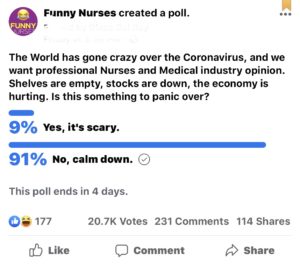Public health officials are urging healthcare providers and the general public not to panic over the coronavirus. Those at risk of getting infected and healthcare workers will need access to facemasks, hand sanitizer, and other supplies, so don’t start stocking up unless you really need them. Panicking will only make matters worse.
In a recent poll, over 20,000 medical professionals were asked, ‘Are you concerned?’ The results are staggering. A majority 91% of Nurses and medical professionals are urging the public to stay calm and not change their life, citing human behavior being the problem.

The comments from our medical community:
Destiny commented:
It is something to be aware of so we can make smart decisions, but definitely not something to panic over. Wash your hands, don’t go out if you’re sick unless you have to. Stop stealing hospital and clinic supplies!
Nicole mentioned:
Scary that 1) people are becoming increasingly racist and xenophobic 2) people are stock piling resources like masks that may be causing shortages for healthcare facilities. I have even heard of thefts of masks like N95s prompting removal of masks from general areas.
Charlene:
The virus isn’t scary, the potential to have to shut down everything because we all have to stay at home because we have caught it is scary.
Miranda:
I mean…. I’ve never seen people wearing hazmat suits,forcing entire cruise ships into quarantine and threatening to cull pets over the flu. 🤷♀️🤷♀️🤷♀️ So it’s a little scary!!
That’s why it’s important to get information from reliable sources, such as the Centers for Disease Control and Prevention and the World Health Organization, so you don’t spread false facts and information that could lead to unnecessary panic.
Keep these facts in mind to stay calm:
Who’s at Risk?
- Asian Americans are just as likely to get the virus as Caucasian Americans. Don’t assume individuals have the virus based on their ethnicity.
- The threat to the American population remains relatively low. Only those that may have been in close contact with a person known to have COVID-19, those that have recently traveled to infected areas, and those with respiratory symptoms and underlying health conditions should get tested. If you have flu-like symptoms and meet the criteria mentioned above, contact your local or state health department.
What Is It Like to Get the Virus?
- The vast majority of cases are mild. A recent study from China shows 80% of confirmed cases had fairly mild symptoms, with no significant infection in the lungs.
- About 15% had severe symptoms that caused significant shortness of breath, low blood oxygen or other lung problems, and fewer than 5% of cases were critical, featuring respiratory failure, septic shock, or multiple organ problems.
- The virus poses a greater risk to older individuals and those with preexisting conditions.
- According to the CDC, the likelihood is that 80% of those that get the virus won’t even know it, and it will pass through their system. You may experience something akin to flu. Treat it as such.
Is It Fatal?
- The mortality rate for the virus remains low. Anywhere between 1 and 3.4% of confirmed cases have been considered fatal. So far, most of those who have died have been elderly, including several patients from a nursing home just outside of Seattle, WA.
- Even elderly individuals have around a 90% survival rate. If you have the virus or think you may have been infected, chances are you won’t die.
How Could I Get It?
- Thus far, most infections have occurred in close quarters, usually inside the home. If you share a living space with someone who may have the virus, you may be infected as well.
- You can get it the same way you’ll catch any other virus.
Can I Get It from Doorknobs and Handrails?
- Yes, the virus seems to linger on hard surfaces for around 72 hours. Wash your hands often, use hand sanitizer or wear gloves when taking public transportation to avoid contamination. Avoid touching your face, eyes, and mouth after being out in public.
What Happens Next?
- The Global-scale panic that the media has caused on this virus is off the charts. Stocks are down, businesses are slow and shelves are empty.
- Unless you have strong evidence to suggest you may be infected, freaking out over the coronavirus will only make matters worse.
- Avoid sharing false information and look for updates from reliable sources.
- A Global panic of this scale has the opportunity to shut down markets, destroy businesses and create a recession. Don’t fuel the flames. If you’re not sick, live life normally. Go to work, go to the store, support your local business.
Older individuals and those with preexisting conditions should monitor their health closely and seek medical assistance if they think they have the virus. However, if you’re healthy, you haven’t been in close contact with someone that’s been infected, and you haven’t traveled to an infected area, there’s no reason to worry.
Share your thoughts in the comments section below.
Sources: https://www.theguardian.com/world/2020/mar/06/coronavirus-facts-what-is-the-mortality-rate-and-is-there-a-cure-covid-19
https://www.cdc.gov/coronavirus/2019-ncov/about/share-facts.html
https://www.who.int/health-topics/coronavirus



Why Social distancing, Halting Travel and Quarantine are Absolutely Necessary
It is no doubt that despite all warnings and research over decades we here in America were not ready for another pandemic. The world was not ready for another pandemic. There has been a false sense of belief that there could not be a repeat of the Spanish Flu or Plague because medicine and technology have advanced so much since that time that it could be halted before it could. What people fail to realize is these same advancements are also our downfall. Viruses are sneaky devils.
By the time you begin to have symptoms, the viral load in your body is high enough to have been infectious up to a week before your symptoms develop. They are capable of mutating in order to survive. If they can not find the same species of host, they adapt for a different species. They also adapt to defy medications we are using to treat them as well. This means as they mutate, they become more resistant and no longer susceptible to being killed by these medications. International travel has made it possible for them to spread quickly over large areas.
There must be a global effort of no travel, social distancing and self quarantine, but truthfully, two weeks is not going to stop it. That would require strict quarantine for over a month. Basically they are just trying to slow it down so they don’t flood the healthcare system all at once.
One of the major hospitals here in Charlotte only has 5 beds allocated for Covid-19 patients. These are regular beds on one end of a hall in order to cohort care. People who are becoming severely I’ll requiring ventilator support will most likely require an ICU bed. There are never enough ICU beds as it is. It takes 3 to 4 hours to get a bed sometimes and that is because they move someone out who is “close enough” to not needing the ICU.
The hospital is just now starting another expansion and by the time that’s done, we will need more. There are roughly 50 ICU beds at CMC main that serve for medical ICU patients, about 25 at Mercy and maybe 40 at Presbyterian Main. Yes, some of the smaller hospitals have ICU beds, but the most critical patients are usually transported to the two main facilities uptown as they do not have the means nor the staff to handle extremely critical patients. The specialists are at the main facilities. These facilities also have specialized ICUs for Cardiac , Neuro, and Surgical patients that if needed could be used, but that is assuming there are no patients with these specialized needs.
Population in city limits went from 300,000 to nearly 1.5 million for Charlotte and its surrounding suburbs in 25 years, not including all the surrounding areas that CMC serves as a major trauma/medical center. If you have even half those people get infected, that’s 750,000 people. If the statistics reign true, 2% of them will have severe complications requiring hospitalization on ventilators etc. That’s 15,000 people and if 1/3 of them show symptoms in 2 to 4 days that is 5,000 and the other patients over 14 days, that means potentially 2500-5000 patients or more needing one of those 150 to 300 ICU beds at the same time. ICUs are staffed at a 2:1 ratio. Say an ICU is fully staffed. One nurse gets sick, no problem. 5 nurses get sick, or 10, there is a HUGE problem.
An ICU nurse is different than a Medical/Surgical or ED nurse. You cant take one of these other nurses and put them in an ICU setting. It takes months of learning and certifications to work independently as an ICU nurse. Our medical centers have plans in place, but unless the public does their part, it will not matter how prepared they are if they do not have enough resources to handle it. We are stretched as it is.
And furthermore, PLEASE DO NOT hoard medical supplies and medications. Patients who are not having severe symptoms with COVID-19 and Influenza are being told to quarantine at home and use Over-the-counter fever reducers and cough suppressants. Recently posts have been made about not being able to find children’s fever reducers such as Tylenol. If they can not find these medications, they will be flooding the healthcare system stressing it even more. Hoarding of medical supplies, especially masks, causes there to be manufacturing backorders. This will already occur due to halting many foreign imports of goods. If healthcare workers don’t have this needed protection, it is certain that staff will become infected worsening the shortage of specially trained personnel.
Statistically, The flu is deadlier, but what is making this worse is we don’t have the resources to treat that many people at once and that increases risk of mortality 10 fold more so than the disease itself. Please do your part. There is no need to hoard items, that is just stressing the economy and leading to shortages and further panic. Do, socially distance yourself, limit travel, and quarantine for symptoms or known exposures. The government is not trying to take your rights. They are trying to control chaos and keep the people safe. People were not practicing the recommended social distancing so now they must take action to ensure social distancing. DO NOT BE PART OF THE PROBLEM!